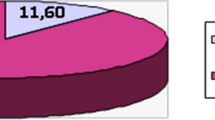Abstract
Functional and linguistic aspects of the speech of Dutch-speaking mothers from three social classes to their 2-year-old children were studied. Mothers' speech in Dutch showed the same characteristics of simplicity and redundancy found in other languages. In a free play situation, both academic and lower middle class mothers produced more expansions and used fewer imperatives, more substantive deixis, and fewer modal verbs than working-class mothers. These differences were not present while mothers were reading books with their children. In general, the mothers' speech was more complex in the book reading situation than during free play.
Similar content being viewed by others
Referneces
Bach, E. (1962). The order of elements in a transformational grammar of German.Language 38:263–269.
Bernstein, B. (1970). A sociolinguistic approach to socialization: With some reference to educability. In Williams, F. (ed.),Language and Poverty: Perspectives on a Theme, Markham, Chicago.
Bloom, L. (1970).Language Development: Form and Function in Emerging Grammars, MIT Press, Cambridge, Mass.
Blount, B. (1973). Aspects of Luo socialization.Lang. Soc. 1:235–248.
Broen, P. A. (1972).The Verbal Environment of the Language-Learning Child, American Speech and Hearing Association Monograph No. 17, December.
Brown, R. (1968). The development of wh-questions in child speech.J. Verb. Learn. Verb. Behav. 7:279–290.
Brown, R., and Bellugi, U. (1964) Three processes in the child's acquisition of syntax.Harvard Educ. Rev. 34:133–151.
Bruck, M. (1972). The influence of kindergarten experience on the language acquisition of children from different socioeconomic backgrounds. Unpublished Ph.D. thesis, McGill University.
Casagrande, J. (1948). Comanche baby talk.Int. J. Am. Ling. 14:11–14.
Ferguson, C. A. (1964). Baby talk in six languages. In Gumperz, J., and Hymes, D. (eds.), The ethnography of communication.Am. Anthropologist 66:No. 6, Part 2.
Ferguson, C. A. (1971). Absence of copula and the notion of simplicity: A study of normal speech, baby talk, foreigner talk, and pidgins. In Hymes, D. (ed.),Pidginization and Creolization of Languages, Cambridge University Press, Cambridge.
Heider, E., Cazden, C., and Brown, R. (1968).Social Class Differences in the Effectiveness and Styles of Children's Coding Ability, Project Literacy Reports No. P.
Hess, R. D., and Shipman, V. C. (1965). Early experience and the socialization of cognitive modes in children.Child Develop. 36:869–886.
Holzman, M. (1972). The use of interrogative forms in the verbal interaction of three mothers and their children.J. Psycholing. Res. 1:311–336.
Irwin, O. (1960). Infant speech: The effect of systematic reading of stories.J. Speech Hearing Res. 3:487–490.
Karnes, M., Teska, J., Hodgins, A., and Badger, E. (1970). Educational intervention at home by mothers of disadvantaged infants.Child Develop. 41:925–935.
Klein, R. (1974)Word Order: Dutch Children and Their Mothers, Publication No. 9, Institute for General Linguistics, University of Amsterdam.
Koster, J. (1974). Dutch as a SOV language. In Kraak, A. (ed.),Linguistics in The Netherlands, 1972–1973, van Gorcum, Assen.
Levenstein, P., and Sunley, R. (1968). Stimulation of verbal interaction between disadvantaged mothers and children.Am. J. Orthopsychiat. 38:116–121.
Newport, E. (1974). Motherese and its relation to the child's acquisition of language. Paper presented at SSRC Conference on Language Input and Acquisition, Boston.
Phillips, J. (1973). Syntax and vocabulary in mothers' speech to young children: Age and sex comparisons.Child Develop. 44:182–185.
Remick, H. (1972). Maternal speech to children during language acquisition. Paper presented at International Symposium on First Language Acquisition, Florence, Italy.
Roeper, T. (1972). Approaches to a theory of language acquisition with examples from German children. Unpublished Ph.D. thesis, Harvard University.
Sachs, J., Brown, R., and Salerno, R. (1972). Adults' speech to children. Paper presented at International Symposium on First Language Acquisition, Florence, Italy.
Shipley, E., Gleitman, L., and Smith, C. (1969). A study of the acquisition of language: Free responses to commands.Language 45:322–342.
Snow, C. (1972a). Children's responses to adult sentences of varying complexity. Paper presented at International Congress of Applied Linguistics, Copenhagen, Denmark.
Snow, C. (1972b). Mothers' speech to children learning language.Child Develop. 43:549–565.
Strickland, J. (1967). The effect of a parent education program on the language development of underprivileged children. Unpublished Ph.D. thesis, George Peabody College for Teachers.
van der Geest, T., Gerstel, R., Appel, R., and Tervoort, B. (1973).The Child's Communicative Competence, Mouton, The Hague.
Ward, M. C. (1971).Them Children: A Study in Language Learning, Holt, Rinehart and Winston, New York.
Author information
Authors and Affiliations
Rights and permissions
About this article
Cite this article
Snow, C.E., Arlman-Rupp, A., Hassing, Y. et al. Mothers' speech in three social classes. J Psycholinguist Res 5, 1–20 (1976). https://doi.org/10.1007/BF01067944
Received:
Issue Date:
DOI: https://doi.org/10.1007/BF01067944




